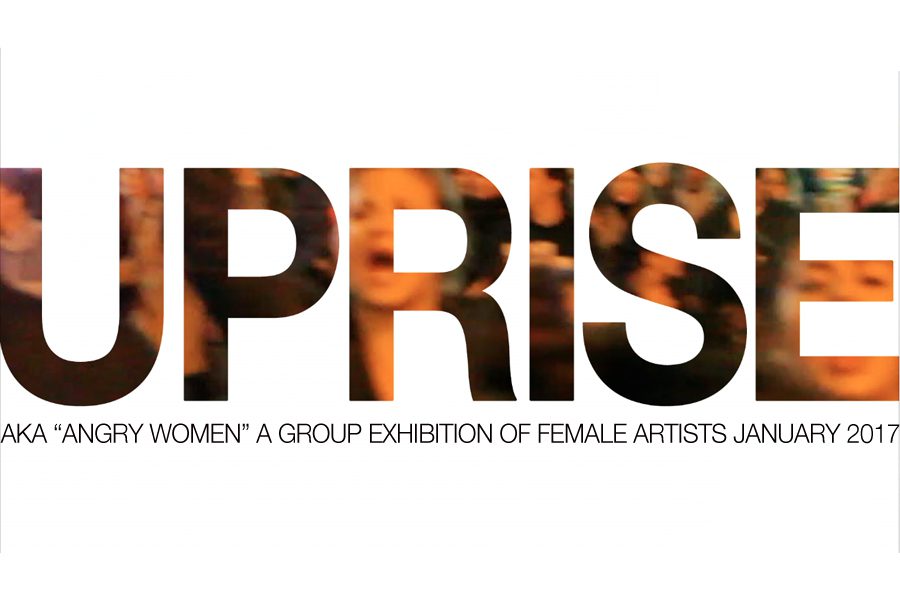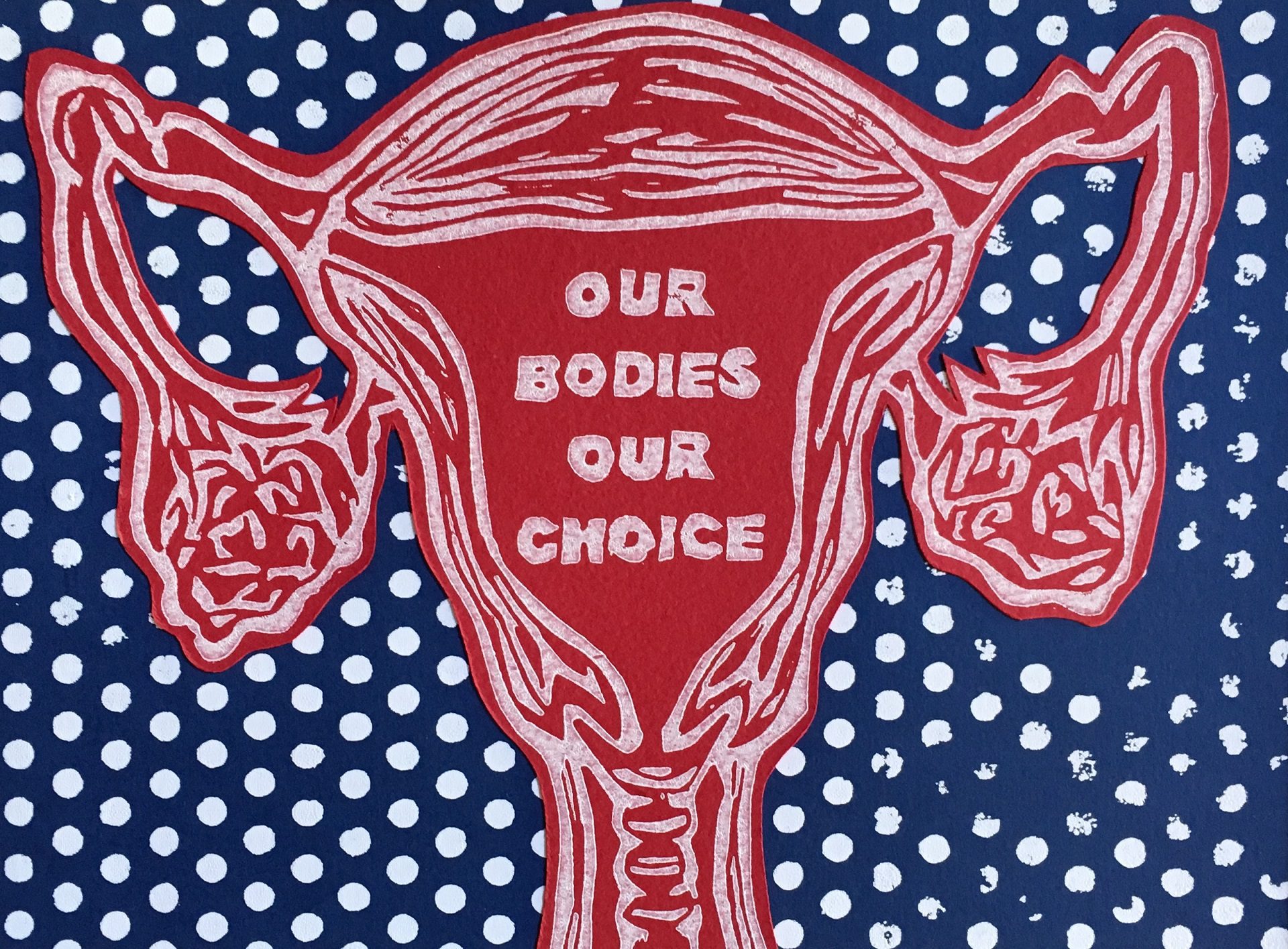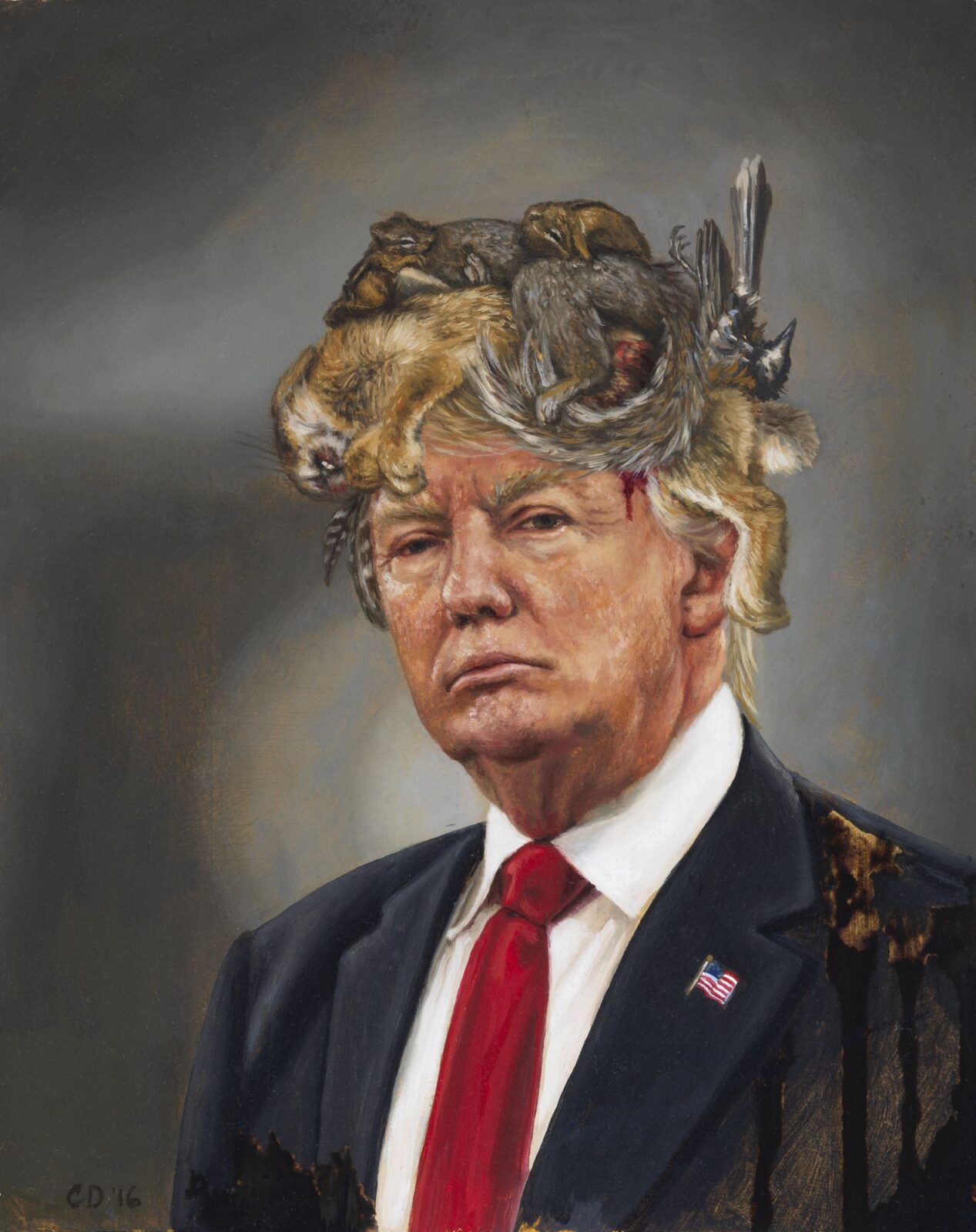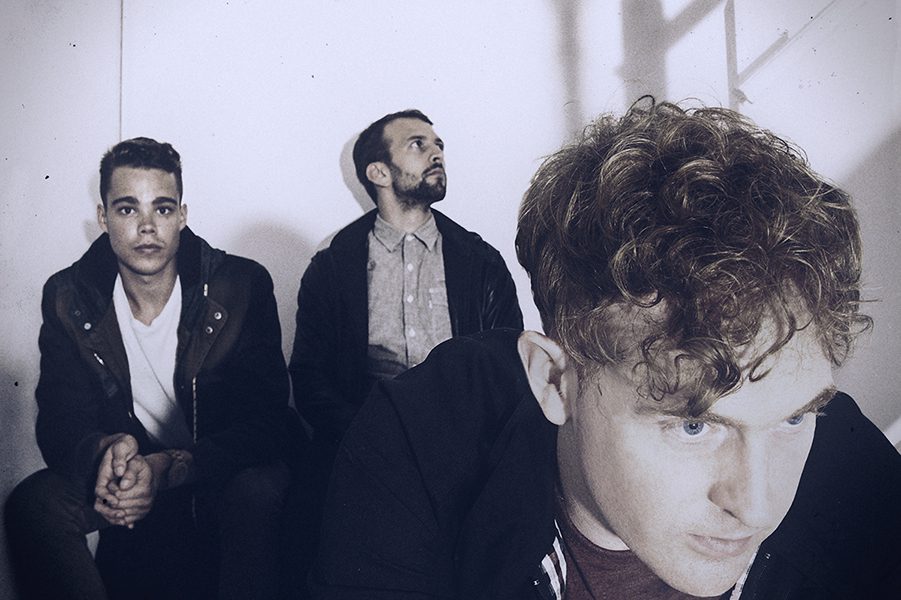
“There is a need to reweave our nation’s social fabric as it is being torn.” This is Linda Friedman Schmidt’s poignant appraisal of Trump’s America. Schmidt is one of 80 female visual artists taking part in UPRISE/ANGRY WOMEN, an exhibition at Tribeca’s The Untitled Space gallery this Tuesday, just in time for the Inauguration – and nationwide marches of resistance. The exhibit will run until January 28th, and will showcase the work of artists from all over the country.
Just two months ago, enraged and stupefied by the outcome of November’s Presidential Election, artist and founder of The Untitled Magazine and Space Indira Cesarine rallied her fellow creative women to action. On The Untitled’s website Cesarine invoked artists to submit topical work embodying their post election fear, devastation, and outrage…it was an open call for artistic activism.
“The 2016 election has brought to the surface extremes of sexism, racism and discrimination,”Cesarine wrote. “A dark cloud looms over those who respect ideals of equal rights, human dignity and humanitarianism…Artists are encouraged to empower themselves and others with works for the “Angry Women” exhibit that responds to the political and social climate as well as explore themes revolving around feminism today and female empowerment.”
UPRISE/ANGRY WOMEN will feature works by new and established contemporary artists, including pieces by Rose McGowan, Jennifer Dwyer, Kristen Williams, Haile Bins, Boo Lynn Walsh, and Cara DeAngelis, to name but a few.
Additionally, the exhibit has partnered with the ERA Coalition – the organization working to pass and ratify the Equal Rights Amendment in our Constitution. The Untitled Space will donate 25% of all proceeds from the exhibit to further their initiative.
I sat down with Cesarine at her gallery to discuss feminist art, a woman’s right to choose, and the importance of solidarity.
Audiofemme: What was the impetus for UPRISE/ANGRY WOMEN?
Indira Cesarine: I think that every woman with any level of integrity, who has any concern with human rights and progression and the importance of diversity and equality – a lot of those people are really shocked by the outcome of the election. I think it was a wake up call to a lot of people. Right now our human rights are being put up in question, and the idea that you can take those as a given is no longer a fact.
I thought this was a great opportunity to shed light on how woman are feeling today, through the work of female visual artists, and not only address how women are feeling about the election, but about the future of women’s rights, about the challenges that women face, and the importance of solidarity.
This is the first exhibit at the gallery that is open to submissions. We had over 400 artists submit over 1,800 works of art.
Originally the show was going to be twenty artists, and I’ve decided to extend it to 80 artists, just one work of art per artist, that way we can have as many different women in the show as possible. The work is so unique and has so much passion. Quite a few works are unique pieces that have been made just for the show, while others were made while the election was going on or in the past year when everything was reaching blood-boiling temperatures.
What is your biggest fear in regards to women’s rights given the current political climate?
One of the biggest issues is [fusion_builder_container hundred_percent=”yes” overflow=”visible”][fusion_builder_row][fusion_builder_column type=”1_1″ background_position=”left top” background_color=”” border_size=”” border_color=”” border_style=”solid” spacing=”yes” background_image=”” background_repeat=”no-repeat” padding=”” margin_top=”0px” margin_bottom=”0px” class=”” id=”” animation_type=”” animation_speed=”0.3″ animation_direction=”left” hide_on_mobile=”no” center_content=”no” min_height=”none”][Trump’s] determination to roll back women’s rights with regards to abortion, and I think this is one of the most dangerous and potentially horrific things that could happen to women today. I strongly believe that no one should be able to tell a woman whether or not she’s allowed to make decisions with regards to her body…particularly when it comes to the early trimesters of pregnancy.
They just passed in Ohio, a ban on abortions after twenty weeks, and in many states they’re trying to close the gap of when you can have an abortion. But the problem with that is that you can’t even get a lot of the testing for disease and various things that might go wrong in your pregnancy. Like the Zika virus; you have to be further along to be tested for things like that. It’s one of those issues where there are a lot of women that may have been raped, and, just the amount of women who can’t afford to have kids, that may be stuck in the middle of this political war over whether the government should be allowed to dictate these sort of things. I don’t think the government should have anything to do with it.
For me, it’s also a really personal issue, because my grandmother died of an abortion. My mother was eleven when my grandmother died. Her mother had already had several children. She was married to a very abusive man. This was at a time when there was nothing you could really do if you had an abusive husband, there was no legal recourse to do anything for domestic violence, and she got pregnant again.
She finds out she’s pregnant with her fifth child, they’re dirt poor, she cannot afford it…she physically and mentally was not capable of having another child. So she sought out an abortion on her own and died of blood poisoning. She was rushed to the hospital and nobody would help her.
When you look at those circumstances – I really think that could potentially happen today if we revert back to the coat hanger tactics where women have to go to back alleys to get abortions.
This whole pro-life thing, well whose life are supporting here? What about the women who are living and breathing right now on this planet? These basic human rights that people take for granted – at the end of the day that is all potentially going to be pulled out from underneath us, if [Trump] gets his way. I think it’s all a big tactic of reverting women back into the home, being barefoot and pregnant and taking away the progress we’ve made.

It’s absurd because people think that if you make something illegal it goes away, but it’s like Prohibition: it doesn’t go away. Women don’t stop getting abortions…they just get worse abortions.
Exactly.
You’ve formed an alliance with the ERA Coalition for this show; can you talk about the importance of their work?
The ERA Coalition was founded by Jessica Neuwirth, and they have an incredible board of directors which includes Gloria Steinem and a lot of important feminist activists. They’ve recently worked with Patricia Arquette, Jane Fonda and a lot of phenomenal women who are all very vocal about the importance of having an Equal Rights Amendment in the Constitution. I think it’s incredible that in 2017 we still don’t have an Equal Rights Amendment in the Constitution. A lot of people think that it’s in the Constitution, but it’s not. There are all kinds of sex discrimination issues that are in various laws and elements of our system, but when it comes down to making it to the Supreme Court, there is nothing in our Constitution that says that you can’t discriminate against women. Sex discrimination happens on a daily basis to women all over the country, and there’s very little you can do about it.
It’s up to interpretation state-by-state.
Exactly! I think that it’s very important for the ERA to be revisited and that there be a movement for it to be included in the constitution. Many years ago it was three states short of being ratified, but largely in part to this woman Phyllis Schlafly, who insisted that, ‘if there’s an ERA amendment, we’re going to have to use co-ed bathrooms and women might lose some of the rights they have as housewives, and gay men might be able to get married!’ But, guess what? All those things are commonplace now. The ERA amendment never passed because they created this fear campaign that ‘women might have to use co-ed bathrooms and they could get raped,’ and as a result, a lot of women got scared and voted against it. It’s fascinating that it was a woman who created the fear campaign against the ERA amendment, and I hope that it does have a possibility to be reconsidered.
I read in an interview that when you originally became an artist you didn’t initially gravitate towards activism; that it was something you later came to. Was there some kind of catalyst in your experiences that made you think, ‘I have to take action’?
It’s really interesting you ask that. I went to school at Columbia University and I got a triple major in art history, French literature and women’s studies. I was actively working as an artist – painting, printmaking, photography – all kinds of things before I started my path as a professional photographer. I was incredibly active when it came to feminism and women’s rights issues when I was in high school and in college, but with my photography I got steered into working as a fashion photographer. I had all these incredible opportunities that happened to me when I was so young, that diverted my attention away from my artwork and from feminism. As a commercial photographer I tried to create empowering images of women, but often the work gets diluted by the time it is published in the magazines. They edit the photos and definitely the message is lost.
Although I was one of the few female fashion photographers out there when I started in the early 90’s, so in many respects I was a pioneer of sorts as a woman in a male dominated industry. It wasn’t until many years later, after I launched my own magazine, and stopped working freelance, that my interests really shifted back to my art and interest in feminism as an important aspect of my life. I think that when I started working on the GirlPower issue of The Untitled Magazine, which was an entire issue dedicated to feminism produced exclusively by creative women. I think that was a turning point for me for sure. I launched The Untitled Space gallery that same year, which focuses on Women in Art.

How has working so many years in the fashion industry – a microcosm often accused of abetting the objectification of women – altered your perception of how society treats women? Has it informed your approach to feminism?
For many years when I was working as a fashion photographer I didn’t even tell people I was a feminist, as the fashion industry didn’t really align with feminism. It was treated like a bad word for a long time. I think that has changed now as they have seen the younger generation take a vast interest in the subject and it became “trendy” to be a feminist. For the most part I don’t really think the fashion industry (or the modeling industry) really promotes feminism with the general focus being so much on looks. Some designers are incorporating body positive fashion and there is a push for plus sized fashion in the past few years but I think we have a long way to go.
Are there any artists in the show you are particularly excited about?
We received artwork from artists all over the country, and they each brought a different message to the exhibit. I was extremely impressed with the diversity in the artwork, and the artist statements. We had such a varied response – from anger to fear, sadness, and humor. Some of the artwork is very serious, with a dark ominous undertone, while other artists created very powerful satirical works that have an enormous amount of strength in the message behind the humor. We have artwork from emerging seventeen-year-old artists, to very established artists who have exhibited in major museums. Rose McGowan created a very dynamic video art piece called “WOMANSWOMB”.

With exhibits you’ve done like Self Reflection and In The Raw, there was a huge focus on women reclaiming their image from the male gaze; how will UPRISE differ from past exhibitions?
Previous exhibits have had that element, but I think that this particular exhibit is very political in nature. I think that previous exhibits here were very focused on themes revolving around feminism and, like you said, reclaiming the female body. But this particular show is probably one of the most emotionally engaging exhibits. This is probably the most diverse exhibit we’ve done.
I definitely think that the undertone of the female voice as a roar is very powerful throughout all of our exhibits, and it’s my mission to make feminist art as a genre more accessible and viable in the art market, but I also felt that this show meant a lot to women who were grappling with their emotions and trying to figure out how to handle it, and how could they in some way have a positive impact. How could they inspire and empower other women to be the strong voices that we need right now to combat what we have ahead? We need to put our combat boots on.
The idea of anger is really motivating, and it’s a good thing to hear because I think people shy away from it too much.
Oh, so many people said, “do you have to call it Angry Women?” I’m playing on the stereotype of women being angry as being bad; that women have to smile all the time, be pretty, be nice to everyone; that women can’t have a stern, distinctive point of view, strong voice; that they’re not allowed to be leaders in their community or the workforce, because what happens when you have a female boss, if she’s remotely strong, everybody says she’s a bitch. Men don’t get treated that way; it’s a total double standard. I think that’s one of the biggest things holding women back. That systematic attitude that a powerful woman is angry…there’s something wrong with that.
I couldn’t agree more. I think the whole idea of just being ‘positive’ and not speaking up is such a subjugating tactic.
Of course. I think that it’s important to channel your anger in a positive way so that you can empower yourself and empower others while you’re at it.
I was thinking of the exhibition when I saw Madonna’s speech at the Billboard Women In Music Awards; what did you think of it?
I thought it was very powerful, we wrote about it in Untitled, I thought it was great. I think she said some very powerful things about the stereotyping and discrimination she faced being a female in music. I think that it is important for women to speak up and be honest on these subjects and it was a brave thing for her to do.
Within the music industry, many feminist musicians take issue with language like “Front-woman” or “Female Musician.” How do you feel that nomenclature exists within the art world? Is saying “Female Artist” empowering or limiting to you?
I know a lot of female artists who feel their gender has nothing to do with their work, and for many it’s not relevant. I think when it comes to feminist art as a genre, your work is revolving around your gender as a focus, so it’s a different story. I personally have no problem putting “female artist” in front of my name, I’m proud to be a woman and for me personally it’s something that is relevant to my work.
UPRISE/ANGRY WOMEN opens Tuesday, January 17th at The Untitled Space gallery, 45 Lispenard St, NY.





